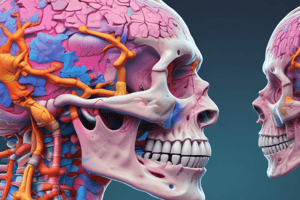Podcast
Questions and Answers
Why is it important to perform a native scan before administering IV contrast for a CT scan?
Why is it important to perform a native scan before administering IV contrast for a CT scan?
- To reduce the risk of allergic reactions to contrast media.
- To identify any calcifications that may be obscured by contrast. (correct)
- To improve the visualization of vascular structures.
- To assess the patient's renal function prior to contrast administration.
What is the recommended contrast administration rate for a CT scan in ml/s?
What is the recommended contrast administration rate for a CT scan in ml/s?
- 6-8 ml/s
- 8-10 ml/s
- 1-2 ml/s
- 3-5 ml/s (correct)
Why is the early portal phase (40-50 seconds) considered the most important phase in CT imaging of the pancreas?
Why is the early portal phase (40-50 seconds) considered the most important phase in CT imaging of the pancreas?
- It minimizes radiation exposure to the patient.
- It allows for maximal opacification of the pancreas parenchyma. (correct)
- It provides the best visualization of arterial blood supply to the pancreas.
- It's when the liver shows peak enhancement.
If a patient weighs 70 kg, what is the recommended dose of IV contrast for a CT scan, based on the guideline of 1 cc/kg?
If a patient weighs 70 kg, what is the recommended dose of IV contrast for a CT scan, based on the guideline of 1 cc/kg?
Why might water be used for bowel preparation before a CT scan?
Why might water be used for bowel preparation before a CT scan?
For a standard abdominal CT protocol, what slice thickness is generally recommended?
For a standard abdominal CT protocol, what slice thickness is generally recommended?
In a CT angiogram (CTA) of the abdomen to assess vascular anatomy before surgery, in what phase of contrast enhancement should the images be acquired?
In a CT angiogram (CTA) of the abdomen to assess vascular anatomy before surgery, in what phase of contrast enhancement should the images be acquired?
A radiologist wants to evaluate a patient for potential liver metastases. Which CT phase would be most appropriate?
A radiologist wants to evaluate a patient for potential liver metastases. Which CT phase would be most appropriate?
If the protocol calls for a 70ml contrast dose, and the injector is set to 3.5ml/s, how long will the contrast injection take?
If the protocol calls for a 70ml contrast dose, and the injector is set to 3.5ml/s, how long will the contrast injection take?
A patient has pancreatic inflammation. Understanding the phases of contrast enhancement is crucial. Which phase provides the best visualization of the pancreatic parenchyma?
A patient has pancreatic inflammation. Understanding the phases of contrast enhancement is crucial. Which phase provides the best visualization of the pancreatic parenchyma?
Flashcards
Water for Bowel Prep
Water for Bowel Prep
Utilize water as part of the bowel preparation process before a CT scan.
Scan Native Before IV CM
Scan Native Before IV CM
Perform a native scan (without contrast) to identify any calcifications before administering intravenous contrast media.
IV Contrast Dosage
IV Contrast Dosage
Administer intravenous contrast media at a dose of 1 cc per kilogram of body weight.
IV Contrast Rate
IV Contrast Rate
Signup and view all the flashcards
Slice Thickness
Slice Thickness
Signup and view all the flashcards
Early Arterial Phase
Early Arterial Phase
Signup and view all the flashcards
Early Portal Phase
Early Portal Phase
Signup and view all the flashcards
Late Portal/Hepatic Phase
Late Portal/Hepatic Phase
Signup and view all the flashcards
Study Notes
- Bowel prep should use water.
- Scanning without contrast is important to check for calcifications.
- Use 1 cc of contrast per kg of body weight.
- Inject contrast at a rate of 3-5 ml/s.
- Slices should be 2-3 mm thick.
Timing
- Early arterial phase (20 seconds): Assess vasculature before surgery.
- Early portal phase (40-50 seconds): Provides optimal pancreatic parenchyma opacification.
- Late portal or hepatic phase: Useful for liver imaging.
Studying That Suits You
Use AI to generate personalized quizzes and flashcards to suit your learning preferences.




